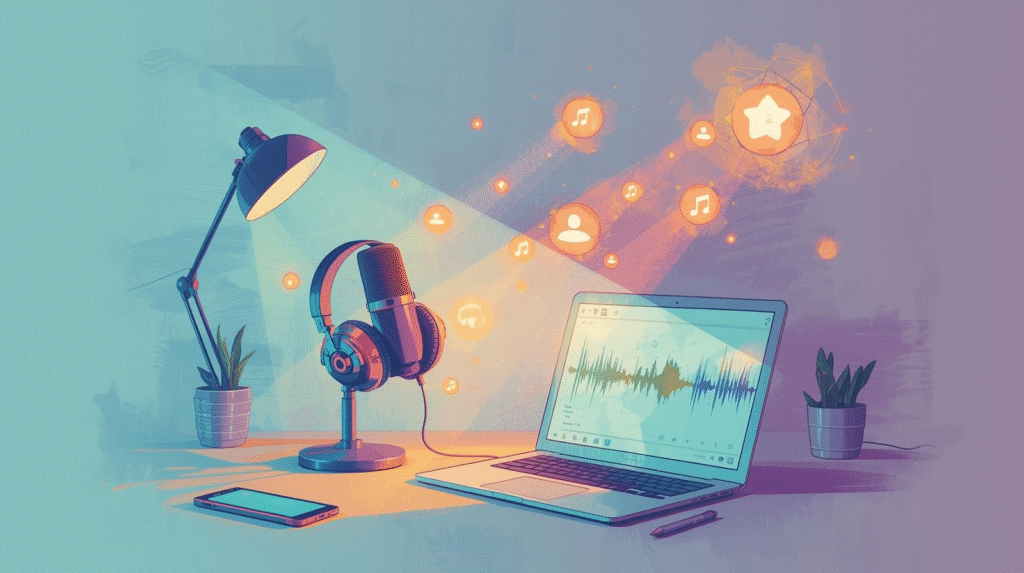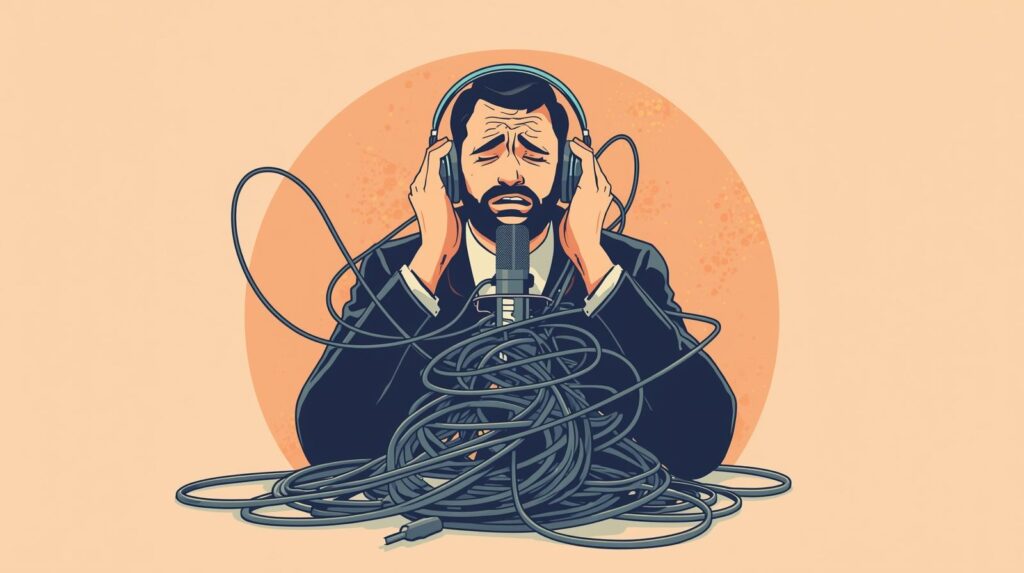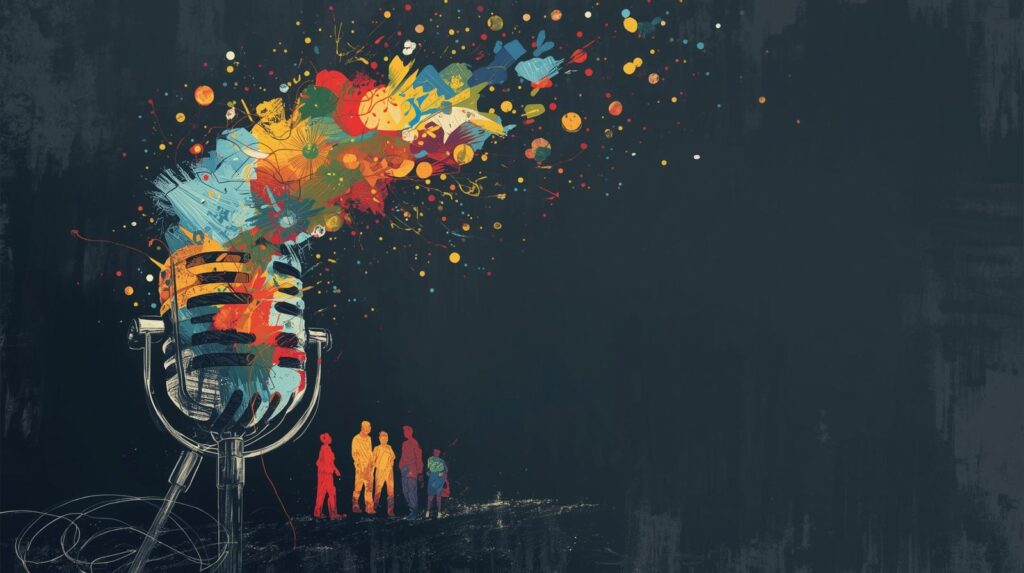🎙️ Podcasting isn’t just growing — it’s exploding.
In 2025, over 500 million people tune in weekly. New shows launch every minute. But behind every great podcast? Hours of editing, scheduling nightmares, promotion burnout, and analytics confusion. Sound familiar?
The good news? You don’t need a big budget to sound pro. Free tools have leveled the playing field — letting beginners launch strong and pros streamline their workflow without spending a dime.
👉 In this guide, you’ll discover 15 free tools handpicked to simplify your podcasting process, save you money, and actually help you grow. Whether you’re recording solo or managing a team, there’s something here for you.
Let’s dive in.
1. Audacity — Free, Open-Source Audio Editor
Edit, clean, and polish your audio like a pro — no cost, no catch.
Key Features:
- Multi-track editing for layered sound design
- Noise reduction and EQ tools
- Export in MP3, WAV, and more
- Cross-platform (Windows, Mac, Linux)
- Plugin support for advanced effects
Best Use Case for Podcasters:
Perfect for solo creators or small teams who need to remove background noise, cut awkward pauses, or layer intros/outros — without paying for premium software.
Pros & Cons:
✅ Completely free + open-source
✅ Lightweight and powerful
❌ Steeper learning curve for beginners
❌ No cloud sync or collaboration features
Where to Get It:
👉 audacityteam.org
2. Spotify for Podcasters (formerly Anchor) — All-in-One Hosting & Distribution
Host, distribute, and monetize your show — for free.
Key Features:
- One-click distribution to Spotify, Apple, Google, etc.
- Built-in monetization (ads, listener support)
- Episode analytics dashboard
- Remote recording feature (limited)
- Easy-to-use web and mobile apps
Best Use Case for Podcasters:
Ideal for new podcasters who want to launch fast without worrying about RSS feeds, hosting fees, or platform submissions.
Pros & Cons:
✅ Totally free with no hidden costs
✅ Super intuitive for beginners
❌ Limited advanced analytics
❌ Less control over RSS feed customization
Where to Get It:
👉 podcasters.spotify.com
3. Canva — Drag-and-Drop Design for Non-Designers
Create eye-catching cover art, social posts, and audiograms — no design degree needed.
Key Features:
- Thousands of podcast-specific templates
- Brand kit for consistent colors/fonts
- Animated audiogram maker (Pro feature, but free tier is robust)
- Resize designs for different platforms
- Free stock photos and icons
Best Use Case for Podcasters:
When you need to promote your episode on Instagram, design a slick cover, or make quote graphics — fast and free.
Pros & Cons:
✅ Extremely user-friendly
✅ Huge template library
❌ Some premium elements require Pro
❌ Limited animation in free tier
Where to Get It:
👉 canva.com
4. Trello — Visual Project Management for Podcast Teams
Organize episodes, guests, and deadlines with boards, lists, and cards.
Key Features:
- Drag-and-drop task management
- Assign team members and due dates
- Attach scripts, show notes, audio files
- Integrate with Slack, Google Drive, etc.
- Mobile and desktop apps
Best Use Case for Podcasters:
Managing your editorial calendar, tracking guest outreach, or coordinating with co-hosts and editors — all in one visual space.
Pros & Cons:
✅ Free for unlimited personal boards
✅ Clean, intuitive interface
❌ Limited automation in free plan
❌ File upload limit (10MB per attachment)
Where to Get It:
👉 trello.com
5. Calendly — Automate Guest & Listener Scheduling
Let guests pick their own interview slot — no more email ping-pong.
Key Features:
- Syncs with Google, Outlook, iCloud calendars
- Customizable booking pages
- Time zone detection for international guests
- Buffer time between meetings
- SMS/email reminders
Best Use Case for Podcasters:
Scheduling interviews without the back-and-forth. Perfect for booking guests, listener Q&As, or sponsor calls.
Pros & Cons:
✅ Free plan covers most solo podcasters
✅ Reduces scheduling friction dramatically
❌ Only 1 calendar connection in free tier
❌ Limited customization on free plan
Where to Get It:
👉 calendly.com
6. Descript — Edit Audio by Editing Text (Free Tier Available)
Transcribe, edit, and publish your podcast — all in one place.
Key Features:
- AI-powered transcription (3 hrs free/month)
- Edit audio by deleting text
- Overdub feature (clone your voice — paid)
- Basic video editing for audiograms
- Publish directly to hosting platforms
Best Use Case for Podcasters:
If you hate scrubbing through audio waveforms, Descript lets you edit by typing — saving hours per episode.
Pros & Cons:
✅ Revolutionary text-based editing
✅ Free tier generous for starters
❌ Watermark on exported videos in free plan
❌ Overdub and advanced features require Pro
Where to Get It:
👉 descript.com
7. Headliner — Turn Episodes into Viral Audiograms
Create shareable video clips with animated waveforms and captions.
Key Features:
- Auto-generate captions from audio
- Add images, GIFs, and branding
- Resize for Instagram, TikTok, YouTube Shorts
- Free watermark-free exports (limited per month)
- Analytics on clip performance
Best Use Case for Podcasters:
Promoting your best moments on social media to attract new listeners — without hiring a video editor.
Pros & Cons:
✅ Super easy to use
✅ Free plan includes 10 watermark-free exports/month
❌ Limited customization in free tier
❌ Monthly export cap
Where to Get It:
👉 headliner.app
8. Auphonic — Auto-Level Your Audio for Consistent Sound
Fix volume levels, reduce noise, and enhance audio quality with one click.
Key Features:
- Automatic loudness normalization (LUFS)
- Noise and hum reduction
- Cross-platform web & desktop app
- 2 hours free processing/month
- Presets for podcasts, YouTube, etc.
Best Use Case for Podcasters:
When your co-host’s mic is too quiet or your audio sounds “muddy” — Auphonic fixes it fast, even if you’re not an audio engineer.
Pros & Cons:
✅ Professional-grade leveling for free
✅ Saves hours of manual tweaking
❌ Free tier limited to 2 hours/month
❌ Web interface only (no offline editing)
Where to Get It:
👉 auphonic.com
9. OBS Studio — Record Live Streams & Remote Sessions
Capture your screen, mic, and webcam — perfect for live podcasting or video episodes.
Key Features:
- Record multiple audio/video sources
- Scene switching for professional transitions
- Free and open-source
- Plugins for advanced functionality
- Stream directly to YouTube, Twitch, etc.
Best Use Case for Podcasters:
Recording video podcasts, live Q&As, or capturing Zoom interviews with higher quality than screen recording.
Pros & Cons:
✅ Extremely powerful and free
✅ Great for hybrid audio/video shows
❌ Can be overwhelming for beginners
❌ Requires some setup and testing
Where to Get It:
👉 obsproject.com
10. Zoom — Reliable Remote Interview Tool
Record high-quality interviews with guests anywhere in the world.
Key Features:
- Record locally or to cloud (free plan = local only)
- Screen sharing and virtual backgrounds
- Up to 100 participants (40-min limit on free tier)
- Transcription available (paid feature)
- Works on desktop and mobile
Best Use Case for Podcasters:
Interviewing remote guests with decent audio/video quality — and recording the session for editing later.
Pros & Cons:
✅ Familiar, reliable, and widely used
✅ Local recording avoids cloud fees
❌ 40-minute limit on group calls (free)
❌ Audio quality not studio-grade without tweaks
Where to Get It:
👉 zoom.us
11. Alitu — Podcast Maker for Non-Techies (Free Tools Section)
Simplify editing, add music, and publish — without touching a waveform.
Key Features:
- Auto-editing tools (trim silences, level audio)
- Library of royalty-free music and effects
- One-click publishing to your host
- Show notes generator
- Free trial + free tools (like audio repair)
Best Use Case for Podcasters:
If editing feels overwhelming, Alitu’s guided workflow helps you polish episodes in minutes — not hours.
Pros & Cons:
✅ Designed specifically for podcasters
✅ Huge time-saver for beginners
❌ Full features require paid plan
✅ Free tools (like audio cleanup) still valuable
Where to Get It:
👉 alitu.com
12. Otter.ai — AI Transcription for Show Notes & SEO
Turn your spoken words into searchable, shareable text — for free.
Key Features:
- 300 monthly transcription minutes (free)
- Speaker identification
- Export as text, PDF, or SRT
- Search within transcripts
- Integrates with Zoom, Google Meet
Best Use Case for Podcasters:
Creating SEO-friendly show notes, pulling quotes for social media, or making your content accessible to hearing-impaired listeners.
Pros & Cons:
✅ Fast, accurate AI transcription
✅ Free tier generous for solo creators
❌ Accuracy drops with heavy accents or crosstalk
❌ Paid plans needed for longer shows
Where to Get It:
👉 otter.ai
13. Buffer — Schedule Social Posts Across Platforms (Free Plan)
Promote your episodes without logging into 5 apps every day.
Key Features:
- Schedule posts to Instagram, Twitter, Facebook, LinkedIn
- Analytics on post performance
- Browser extension for quick sharing
- 10 scheduled posts per profile (free)
- Simple, clean interface
Best Use Case for Podcasters:
Automating your social media promotion so you can focus on creating — not posting.
Pros & Cons:
✅ Easy to use + great for beginners
✅ Free plan covers basic needs
❌ Only 3 social accounts in free tier
❌ Limited analytics compared to paid
Where to Get It:
👉 buffer.com
14. Notion — All-in-One Workspace for Show Notes & Planning
Plan episodes, store scripts, track analytics, and manage guests — in one flexible space.
Key Features:
- Customizable databases and templates
- Embed audio, video, calendars, and to-do lists
- Collaborate with team members
- Free for personal use
- Mobile and desktop apps
Best Use Case for Podcasters:
Centralizing your entire podcast workflow — from brainstorming to publishing — without juggling 10 different apps.
Pros & Cons:
✅ Incredibly flexible and powerful
✅ Free for solo creators
❌ Overwhelming if you don’t start simple
❌ Offline mode limited
Where to Get It:
👉 notion.so
15. Zencastr — High-Quality Remote Recording (Free Tier)
Record studio-quality audio from remote guests — even if their internet sucks.
Key Features:
- Records each participant locally (no quality loss)
- Video recording option
- Auto post-production (noise reduction, leveling)
- 8 hours free recording/month
- Export individual tracks for editing
Best Use Case for Podcasters:
Interviewing guests remotely without worrying about Skype-quality audio or dropouts.
Pros & Cons:
✅ Local recording = pro sound quality
✅ Free tier includes essential features
❌ Watermark on video exports (free)
❌ Browser-based — needs good internet
Where to Get It:
👉 zencastr.com
🎧 Final Thoughts: Free Tools = Smarter Podcasting
You don’t need a big budget to build a standout podcast. These free podcast tools handle everything from recording crystal-clear audio to promoting your episodes — so you can focus on what matters: your message and your audience.
💡 Start small. Pick 2–3 tools from this list that solve your biggest pain points right now. Maybe it’s editing (Audacity), scheduling (Calendly), or promotion (Buffer). Try them this week.
The truth? Podcasting has never been more accessible. Whether you’re launching your first episode or scaling your 100th, these resources will save you time, money, and stress.
✅ Bookmark this guide.
✅ Share it with your podcasting friends.
✅ Explore one tool today.
Your next great episode is waiting — and now, you’ve got the tools to make it happen.


